Water Tech Fest: Caught in the battle between game changers and game keepers
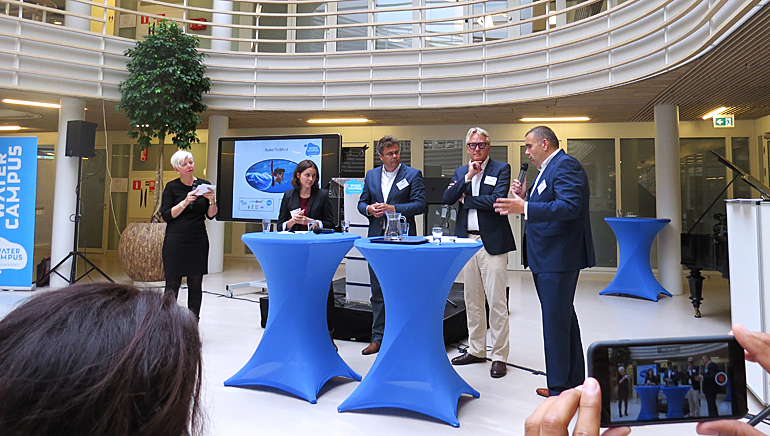 Water you can eat. One of the startups at the Water Tech Fest event was a group of three London-based designers that want to start production of a small packaging made from seaweed that contains water. Their product - the Ooho - was presented as an alternative for a water bottle that is thrown away after use.
Water you can eat. One of the startups at the Water Tech Fest event was a group of three London-based designers that want to start production of a small packaging made from seaweed that contains water. Their product - the Ooho - was presented as an alternative for a water bottle that is thrown away after use.
The Ooho reflects the growing demand by consumers that are concerned about environmental issues.
It was one of the many 'green' technologies that were pitched by 25 startups and scaleups at the Water Tech Fest event at the WaterCampus Leeuwarden on 25 May.
The event was part of the full week programme of Startup Fest Europe with similar match making meetings for different sectors.
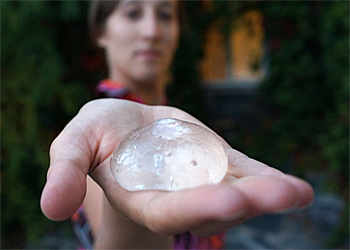 A game changer: the Ooho - potable water packed in eatable seaweed.
A game changer: the Ooho - potable water packed in eatable seaweed.
Game changers versus game keepers
New 'green' technologies that hardly use water or fossil fuel, or produce no waste, will be tomorrow's game changers. That is what most startup and scaleup told their potential financers.
However, their biggest competitors are the game keepers that stick to the concept of large piped water networks with centralized treatment at high-tech plants.
The large centralized water works have a long time span, with high investments that demand strict tariff payments for many years.
So once invested, gate keepers welcome only small innovations for optimization, and keep out the disruptive innovations.
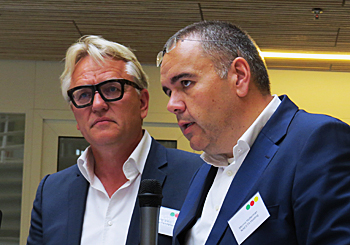 Two experienced entrepreneurs in the panel, Florian Bollen (left) of Aquiva and Menno Holterman (right) of Nijhuis Industries, shared their best piece of advice.
Two experienced entrepreneurs in the panel, Florian Bollen (left) of Aquiva and Menno Holterman (right) of Nijhuis Industries, shared their best piece of advice.
Long way to success
This was only one of the potential barriers for innovative startups, mentioned during the event, "Infact, development of new technology is the easy part", explained CEO Menno Holterman of the Dutch water technology firm Nijhuis Industries at the closing panel discussion.
Holterman mentioned four circumstances that are required for a new technology to become successful. "Next to a new technology, there also has to be a demand, an institutional support and a financer as well. If one of these fails, the introduction cannot be successful".
This is why Holterman advised the startups in the audience to cross borders and align with other industries. "Customers, especially in the industry, are looking for solutions, not filters", drawing from his long standing experience as supplier of water technology to industrial clients.
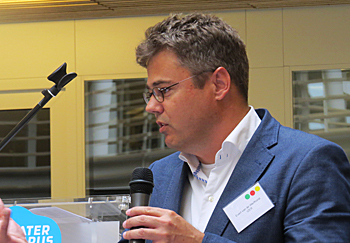 Evert van der Werfhorst of Izer warned for the different dynamics amongst water users in the industry, municipalities and agriculture.
Evert van der Werfhorst of Izer warned for the different dynamics amongst water users in the industry, municipalities and agriculture.
A need to focus
Where Holterman advised startups to broaden up across sectors, he advised scaleups to focus. "To find your way into the global market, you have to geolocalise. You need to understand the local circumstances and adopt your product or service."
Panel member Evert van der Werfhorst of IZER, once a startup himself with sensor technology, also talked about a focus. "The water technology market is very divers. Municipalities are very different from industries and agriculture. They all have different dynamics, so you need to focus."
Van de Werfhorst considered the agriculture as the biggest potential sector for new water technology, if it were not for 'the ridiculous low water prices'.
Smaller role for expensive networks
Panel member Florian Bollen, CEO of Aquiva Foundation that supplies standalone desalination installations, touched upon the global collapse of large and expensive networks in the energy and telecom markets. "New technologies have caused a revolution in these sectors. There is less dependency on the network". Bollen wondered if this global trend will also affect the water sector.
New financial models
Bollen warned that investors are only interested in a quick return on their investment. "However, water is essential for live, so it is not only about money".
If fact, he said, poor people that are not connected to a water distribution network, pay the highest price. "Either they pay for very expensive bottled water, or they sacrifice their health by drinking contaminated surface water."
Menno Holterman suggested the introduction of new service models based on the price people are willing to pay for their water. The advantage is that such a financial scheme can be much more flexible than the ridged tariff-based ones. "Build your water business around a commercial social innovations", he advised the present startups and scaleups.
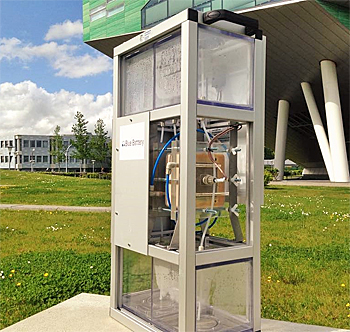 Another potential game changer: the Aquabattery (prototype) that uses only water and table salt.
Another potential game changer: the Aquabattery (prototype) that uses only water and table salt.
Some of the ideas that were pitched by startups and scaleups, included:
● Desolenator (UK)
a mobile desalination system - shaped like a wheeled suitcase - powered by a photovoltaic panel
● AQysta (Netherlands)
a pump that floats in a river and powered by the flow of the water.
● Aquabattery (Netherlands)
a battery that stores electricity solely using water and table salt
● SanOx (Finland)
an aeration system using vortex technology
● Aquarobur (Sweden)
a flow meter that is powered by the water flow in the pipe
Read also on this website
● Water Tech Fest: Let’s make disruptive water technology happen, 26 May 2016
● Water Tech Fest - Be part of the biggest startup festival on the planet!, 3 May 2016
More information
Water Tech Fest
www.watertechfest.nl
WaterCampus Leeuwarden
Leeuwarden, the Netherlands
+31 58 284 90 44
www.watercampus.nl



